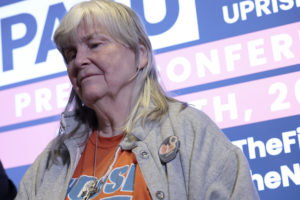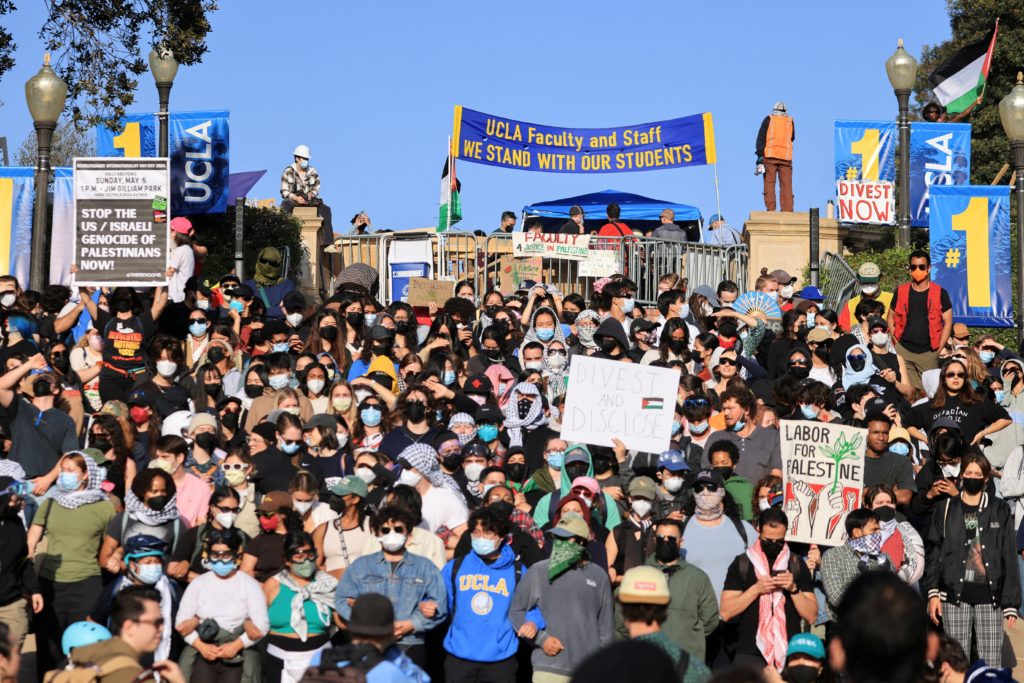What are we to make of the widespread pro-Palestine campus protests across the country?
Here in Southern California, their epicenter has been at UCLA and USC, and counter-protests have led to violence. Mayor Karen Bass and Governor Gavin Newsom are calling for investigations. They’ve even gotten the attention of leaders in the Holy Land, where Cardinal Pierbattista Pizzaballa, the Latin Patriarch of Jerusalem, said he struggled to understand their logic.
“Universities are places…where engagement with strong ideas that are completely different, must be expressed not with violence, not with boycotts, but with knowing how to engage,” he said earlier this month.
Closer to home, one of my friends thinks that the protests reflect a student cohort that's been molded by social media and that doesn't really know what it’s rebelling against. Another friend has wondered out loud where the students’ money is coming from.
Pundits are also comparing today’s escalating protests with the student protests of the Vietnam war era. Commentators are asking whether something like the protests that roiled Chicago’s Democratic Convention in 1968 will upend the Democratic Convention of 2024 (also taking place in Chicago, coincidentally).
Well, I remember 1968. That year, Providence had led my wife and I to start a Catholic Worker House in Saginaw, Michigan. Folks came and left. Some committed, some not. Among them were members of the Weather Underground on their way to the Democratic Convention to “do their thing.” Not long afterwards, we read that some of them managed to blow themselves up in a basement bomb factory. Violent protest has a cruel trajectory.
What about 2024? Sure, there’s plenty to protest about and grieve for. War is always a human failure. Hamas fighters initially killed about 1,200 Israelis, mostly civilians, and took about 250 hostages. Israel, in response, has reportedly killed more than 34,000 Palestinians in Gaza. Hamas continues to use civilians as shields. Israel continues its often indiscriminate attacks. Indifference in light of these actions is inexcusable.
To be sure, we need discernment if we are to judge today’s protests. True discernment makes use of pivotal criteria.
First, since protest is a means to end, the end that protestors seek must be worthy and clearly stated. Protest is expressive, but it must be much more. Second, the means of protest must be non-violent. The means are the end, so to speak, in its coming to be. Terror becomes tyranny. Third, those who protest need the personal discipline without which they cannot succeed. Without discipline, the end is lost sight of, and the means become disproportionate.
It’s important to apply these criteria, and their application calls for prudence, that is, right reason in acting. It is a virtue at once intellectual and moral. So in exercising prudence we begin with taking counsel; having done so we take action. Conscience comes into play. Indeed, conscience as judge is one’s last best exercise of practical reason, of informed reason. No one can examine the conscience of another. Protestors, like the rest of us, must examine their own.
A thought experiment comes to mind. Suppose I am having a conversation with Mayor Bass, Governor Newsom, Cardinal Pizzaballa, and some of my dear and candid friends I referenced earlier. What would I offer for their consideration in light of the criteria I have identified?
To begin with, I would politely tell the Mayor and the Governor that investigations must have their own criteria and that they should be made public. If they fail to do so, they lack credibility. And what would I say to the cardinal? For (another) start, I would say that universities are places of engagement, but equally they are places that ought to uphold justice and respect human dignity. Yet here in California, one major university helps develop the country’s nuclear weaponry while another conducts grotesque fetal experimentation. Students do well to hold them to account.
As the thought experiment comes closer to home, what do I say to my candid friends? Yes, social media shapes and sometimes deforms students. But social media also conveys a measure of self-criticism. It admits to the sinkhole of excessive screen time, and students know as much. And, yes, students can be distressingly inarticulate about their own rebellion.
But their suffering should be no surprise when, as happens in postmodernity, they have grown up in a culture of the absurd. That leaves my friend who bids us to follow the money, the money that props up the student encampments. But in most cases, there probably isn’t much money to follow: In Los Angeles, hundreds – probably thousands – of students are living out of their cars (plus, eating ramen in a tent doesn’t cost more than eating it in a dorm).
The late Dorothy Day, founder of the Catholic Worker movement and recently recognized as “Servant of God” by the Catholic Church, spoke and wrote often about personal responsibility.
Reflecting on today’s situation, I remembered a pertinent exchange we had in 1968 in which she lamented the fecklessness of some of my generation.
I wasn’t shy about expounding on, in her presence, Gandhi’s insistence on discipline in the practice of satyagraha, or passive political resistance, and how demonstrations would achieve nothing without it.
“You are not Gandhi,” she replied to me. It was enough to shut me up.
Her point, of course, was not that I was mistaken about what Gandhi taught. Rather, it was that I should spend more time becoming like Gandhi and less time bewailing the shortcomings of others. Nowadays, though, I am most thankful for a different and living example: a woman named Joan Andrews Bell, who today sits in jail for joining a nonviolent rescue action taken to save the most vulnerable of us all, preborn babies scheduled for abortion.

Bell’s was an exemplary protest. Even in the silence of a cell, her discerning witness to life speaks clearly: a costly act for which she pays up personally.

